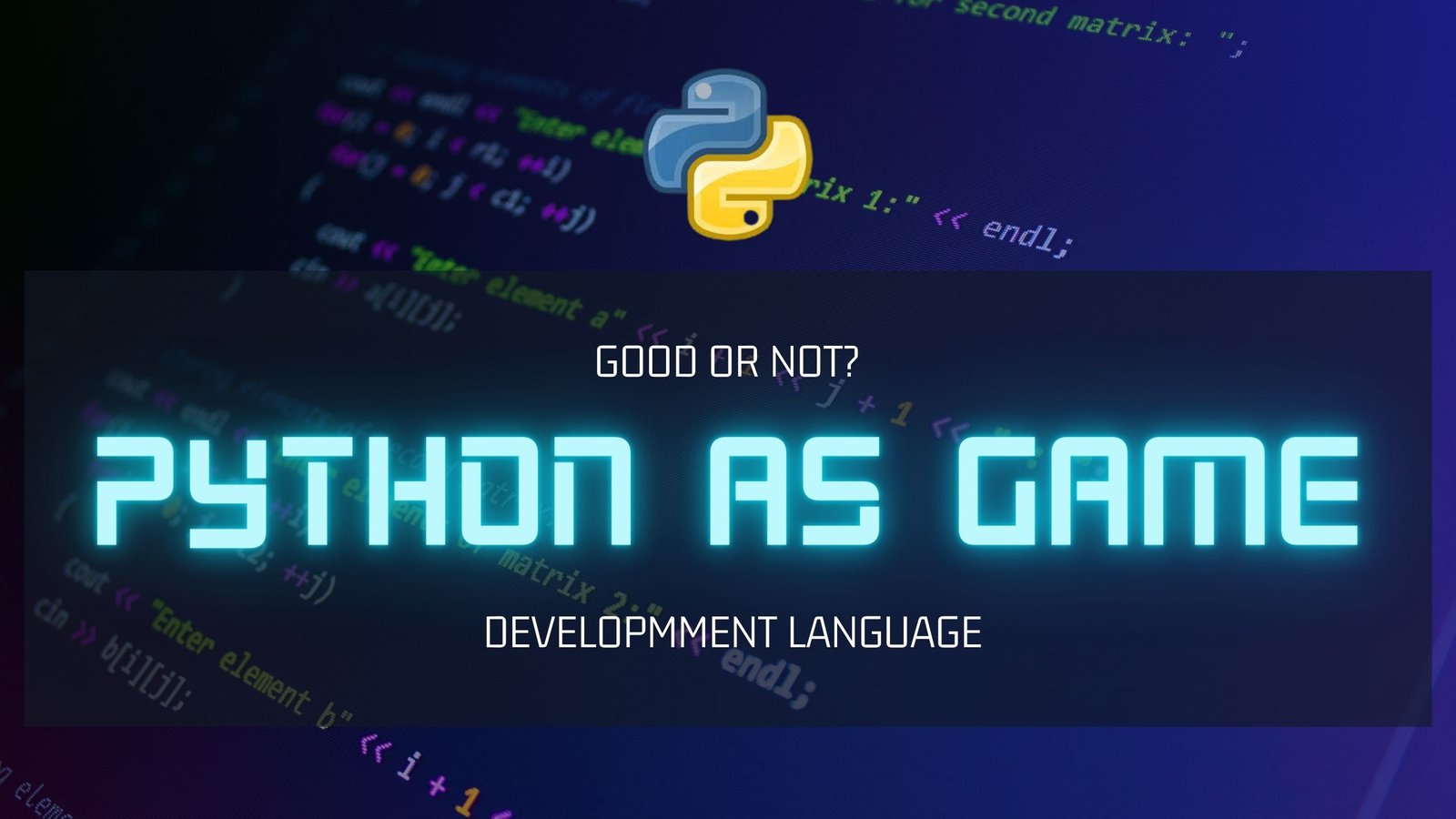
Is python good for game development
Is python good for game development, The programming language Python, an advanced, interpreted language for programming, is simple, readable, and powerful. Guido van Rossum produced it in 1991. Python’s structure prioritizes code readability and clear syntax, making it easy to create and recognize.
Since Mobiles got almost as powerful as PCs, game development is a common issue. Engineers want to develop games because investors invest a lot. However, some developers design games for the enjoyment of their families.
This article will examine if Python is a decent game development language and who should use it. Before starting learning that python is Good or not we’ll talk about its features and the other languages that are used in game development so that you will have a clear concept, in understanding to which language to use in game development.

| Key features of Python Language |
|---|
Readability: Python has a clear syntax. Instead of curly brackets or keywords, it employs indentation (whitespace) to create code blocks, making it more readable. |
Python’s flexibility is what makes it ideal for novices. Abstractions at the highest level and a simple syntax let developers concentrate on problem-solving. |
Versatility: Python may be used for web programming, data analysis, scientific computing, AI, machine learning, game creation, and more. Its extensive library and framework ecosystem provides ready-to-use solutions for diverse tasks. |
Python supports Windows, macOS, Linux, and mobile platforms. Cross-platform compatibility lets developers create code once and execute it on several computers without substantial changes. |
Strong Community and Libraries: Through forums, tutorials, and open-source projects, Python’s huge and active developer community supports its development. PyPI contains hundreds of libraries that enhance Python’s capabilities, making it easier to reuse code and speed up development. |
Python supports object-oriented programming (OOP), enabling modular, reusable code. Classes, inheritance, and polymorphism enable sophisticated, maintainable code structures. |
Interpreted Language: Python executes line-by-line without compilation. This accelerates development and prototyping. |
Languages That Are Used In Game Development
The creation of video games often makes use of a number of different programming languages, each of which has a unique set of advantages and potential uses. The following are some of the most widely used programming languages in the game development industry:
- C++
- C#
- Java
- Python
- Java Script
- Lua
- UnrealScript and Blueprints
C++
The production of video games often makes use of the complex and high-performance programming language known as C++. This is especially so for large-scale projects like AAA titles. Because it offers low-level control and fast memory management, it is suitable for use in performance-critical systems, gaming engines, and graphics programming.
C#
Microsoft’s C# language is flexible. Game creation, especially with Unity Engine, uses it. C# balances performance and usability, making it suited for many gaming genres and platforms.
Java
Java has become a popular, platform-unique programming language. It is widely employed in both Android game development and server-side game infrastructure. Java is a suitable option for a variety of game development duties due to its durability, portability, and extensive library.
Python
Even though Python is an understood language, it is becoming increasingly popular in game development. It is frequently used for smaller-scale initiatives, prototyping, and independent games. The simplicity, usability, and size of the Python community all contribute to its popularity in game development.
Java Script
JavaScript is utilized for browser-based games and game development with frameworks such as Phaser and Babylon.js. It enables interactive web-based activities that are playable on multiple platforms.
Lua
Game developers employ lightweight, embeddable Lua coding. Game engines like Unity utilize it as a scripting language to generate gameplay logic and change game behavior without recompiling.
Unreal Script and Blueprints
UnrealScript (until Unreal Engine 4) and Blueprints (since Unreal Engine 4) are domain-specific languages used for game development with the Unreal Engine. UnrealScript was a scripting language used in prior versions of the engine, whereas Blueprints offer a visual scripting system for designing game logic through a node-based interface.
Depending on needs and platforms, game developers employ numerous more programming and scripting languages. Performance, development tools and frameworks, target platforms, and developer preferences typically determine language choice.
Is python good for game development
Yes!
Python is useful for game development, depending on your game’s needs. Python may not be the best choice for AAA games, but it has some features that make it an acceptable choice for specific games and game development conditions.
Python, a high-level, interpreted programming language, is simple, readable, and versatile. Python’s structure values code readability and clear syntax, making it easy to create and comprehend.
Advantages Of Using Python In Game Development
- Python syntax is simple and readable. Whitespace (indentation) makes code sections aesthetically beautiful and easier to understand. Intelligibility decreases code maintenance and debugging time.
- Python’s simplicity of use makes it excellent for beginners. Its high-level abstractions allow programmers to devote themselves to solving issues rather than details. Its ease comes from many learning materials and a welcoming community.
- Python can be utilized for various reasons. It broad libraries and frameworks enable web development, data analysis, scientific computing, artificial intelligence, and machine learning. Python’s versatility lets programmers switch fields and use their skills.
- Python’s development community is active. This active community develops Python via forums, tutorials, and open-source projects. NumPy, pandas, TensorFlow, and Django are among Python’s many libraries and packages that enhance its capability and productivity.
- Python is cross-platform and available on Windows, macOS, Linux, and mobile platforms. Cross-platform compatibility lets developers create code once and run it on various computers without major changes, making it ideal for a range of deployment situations and scenarios.
Disadvantages Of Using Python In Game Development
- The programming language Python, an interpreted language, is slow as C++ or Java. Python’s high-level abstractions and simplicity of development may not be ideal for resource-intensive activities or high-performance circumstances. The performance difference may not matter for most applications.
- Python’s Global Interpreter Lock (GIL) maintains thread safety. In certain cases, the GIL limits multi-threading’s performance advantages. Python offers multiprocessing for parallel processing, while the GIL only affects CPU-bound processes.
- Mobile Development: Python may be used for mobile app development, although it may not be as popular or supported as Java or Swift. Native iOS and Android programming uses platform-specific languages and frameworks. Python has Kivy and Bee Ware for cross-platform smartphone development.
Although these disadvantages, Python’s language’s readability, adaptability, and community support have made it one of the most popular programming languages. It remains a developer favorite and is widely used across sectors.
Benefits Of Python In Game Development
- Python’s syntax is straightforward to learn and comprehend. This simplicity might benefit newcomers and developers who prefer simpler languages. Python’s clear syntax speeds up development and debugging.
- Large Community and Libraries: Python’s active developer community provides help, tutorials, and resources. Pygame, Panda3D, and Pyglet are among its many game development libraries. These game-building libraries save time and effort.
- Python’s simplicity and high-level abstractions enable fast development and iteration. In early game creation, this may let you test concepts and enhance gameplay mechanics without becoming mired down in specifics. Python’s simplicity and rapid development speed up iteration.
- Cross-Platform Compatibility: Python games can run on Windows, macOS, Linux, and even mobile devices using Kivy or BeeWare. Your game can reach more people with cross-platform compatibility.
- Integration with Other Technologies: Python works well with physics engines, 3D modeling applications, and game engines like Unity or Unreal Engine. Python’s versatility lets you use additional specialized tools to create more complicated games.
Python may not be ideal for resource-intensive, high-performance games that demand optimal efficiency and speed. C++ or C# may be better. Python is a good choice for independent game developers, hobbyists, educational projects, and smaller projects that value quick development, simplicity of use, and cross-platform compatibility.
Related Topics: How to make an indie game
Python’s 5 Popular Frame Works For Game Development
Pygame

Pygame is an advanced freely available framework for creating 2D games in Python. Pygame’s simplicity keeps it helpful. Its simple API lets developers concentrate on game logic and design.
Pygame provides graphics and sprite functionality to developers. They can draw objects, display text, and load pictures to provide attractive game visuals. Sprites, game objects that may have attributes, move, and interact, are supported by Pygame. This simplifies game element management and animation.
Pygame’s sound and music are another benefit. Background music and sound effects enhance games. Pygame lets developers load and play sounds, modify volume, and manage channels.
Pygame streamlines user input. It lets developers construct dynamic and responsive games by recording keyboard, mouse, and joystick inputs easily. This allows for interactive and immersive games that react to player actions.
Pygame is a flexible game development framework. Python 2D game developers like it for its simplicity, visuals, sound and music support, and user input management.
Panda 3D

Panda3D serves as a free-to-use program as well as a system for developing 2D and 3D games. It offers advanced rendering and graphics capabilities, complete physics simulation, customization options, cross-platform compatibility, and a helpful community.
Using Python and Panda3D, programmers can create visually impressive and immersive games.
Pyglet

Pyglet provides a cross-platform, lightweight graphics library designed especially for game development.
It enables windowing, user input, and multimedia playback, among other features. Pyglet prioritizes simplicity and efficacy, making it an ideal choice for creating 2D games and interactive applications.
Arcade

Python Arcade provides a simple to operate framework for building 2D games. It offers a straightforward and user-friendly API for managing graphics, audio, and user input. Arcade is intended to be simple to learn and encourages the creation of games with contemporary features and high performance.
Cocos2d

Cocos2d has become a well-known framework for game development that’s compatible with multiple programming languages, such as Python. It includes scene management, animation, particle effects, physics simulation, and more for the creation of both 2D and 3D games. Cocos2d is extensively used for the development of mobile games.
Summary On Python As Game Development Language!
Python’s flexibility and simple syntax make it suitable for early game development. Pygame, Panda3D, and Pyglet are game development frameworks and libraries for the language.
Python can be utilized in smaller projects such as, independently game development, instruction, and testing. Python’s multi-platform compatibility enables video games to run on Windows, macOS, Linux, smartphones and tablets.
Python might be less suitable for demanding resources, and high-performance games that demand maximum speed and effectiveness. In these cases, C++ or C# would be preferred. Python’s quick prototyping, straightforwardness of use, cross-platform accessibility, and supportive community make it a good option for many game development conditions.
Related Topics: How to make an rpg in game maker studio